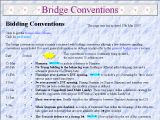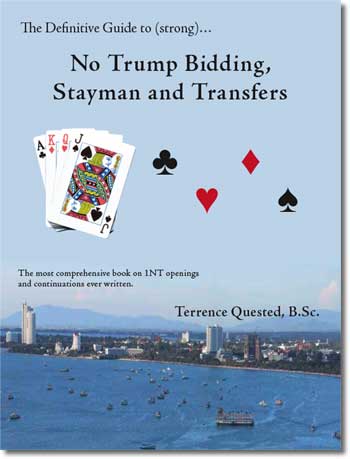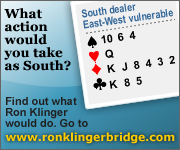| to news-sheet main page |
 |
 |
|||
| to Pattaya Bridge home page |
|||||
 |
to bridge book reviews | to bridge conventions | to No Trump bidding | ||
| to bridge CD's and computer games and software | |||||
Mon 26th †††† N-S ††† 1st† Gerry & Hans Bij†††††††††† 57%†††††† 2nd †† Hans V & Janne†††††††††††††† 57%
††††††††††††††††††† E-W†††† 1st † Derek & Gerard†††††††††††† 55%†††††† 2nd †† Elizabeth & Marlene†††††††† 54%
Wed 28th †††† N-S ††† 1st† Flurio & Pezzini††††††††††††† 61%†††††† 2nd †† Hans V & Lars B†††††††††††† 54%
††††††††††††††††††† E-W†††† 1st† Jens & Vali†††††††††††††††††††† 64%†††††† 2nd †† Bob P &
Fri 30th ††††††† N-S ††† 1st† Janne & Lars B††††††††††††† 66%†††††† 2nd †† Flurio & Pezzini††††††††††††††† 62%
††††††††††††††††††† E-W†††† 1st† Bob S & Johan†††††††††††††† 59%†††††† 2nd
†† Hans
V &
Bidding Quiz†††††††††††††† †††† Standard
American bidding is assumed unless otherwise stated.
Hand A†††††††††† Hand B†††††††††† With Hand A partner opens 1♠, what do you bid?
♠
QJ108††††††††† ♠ A
♥ Q85††††††††††††† ♥ A10 †††††††††††† With
Hand B LHO opens 4♠ and this is passed to you,
♣
KQJ9†††††††††† ♣ AQ7542
††††††††††† †††††††††††††††††††††††††††††††††††††††††††††††
Bidding Sequence Quiz
C†††† 4♠††††† pass†† pass††
D†††† 4♠††††† pass†† pass†† 4NT†††††† What is 4NT?
††††††††††††††††††††††††††††† †††††††††
A RKCB mix-up†††††††††††††††††††††††††††††††††††††††††††† ††††† Board 26 from Monday 26th†† †
Two pairs messed up their (
Dealer:†††††††††††† ♠
64†††††††††††††††††††††††††††††††††††††††††††††† Table
A
West††††††††††††††† ♥ J9632†††††††††††††††††††††††††††††††††††††††† West††††††††† North†††††††† East(A)††† South
N-S vul††††††††††† ♦ QJ65†††††††††††††††††††††††††††††††††††† †††††1♠††††††††††††† pass†††††††††† 2♣†† (1)††† pass
††††††††††††††††††††††† ♣ 106††††††††††††††††††††††††††††††††††††††††††† 3♣†††††††††††† pass†††††††††† 3♦††† (2)††† pass
3NT†††††††††† pass†††††††††† 4NT (3)††† pass
♠ AK932†††††††††††††† N†††††††††††††† ♠ QJ108†††††††††
†††† 5♥††† (4)††††† pass†††††††††† 6♠††† (5)†††
♥ K7††††††††††††††††† W††† E††††††††††† ♥ Q85††††††††††††† †††† all
pass
♣
8542††††††††††††††††††††††††††††††††††† ♣ KQJ9†††††††††††††††† Table B
††††††††††††††††††††††† ♠ 75†††††††††††††††††††††††††††††††††††††††† ††††† West††††††††† North†††††††† East(A)††† South
♥
A104††††††††††††††††††††††††††††††††††††††††† 1♠††††††††††††† pass†††††††††† 2NT (1)††† pass
♦ 109873†††††††††††††††††††††††††††††††† †††† 4♠††† (6)††††† pass†††††††††† pass (7)††† all pass
♣ A73†††††††††††††††††††††††††††††††††††††††††††
And what happened? Everybody was in 4♠+1 except for the two in 6♠ who both went down.
The bottom lines: -
-
In my
opinion it really is essential for a pair well past the beginnerís stage to
have a forcing raise of partnerís 1♥/♠ opening available. Jacoby 2NT is the obvious
choice but there are other options.
-
If you do not have this
simple tool in your bidding armory then you will get into mix-ups like at Table
A when responder has a good hand in support of partnerís major Ė how can he
show good support and later bid RKCB with ♠ís as trumps (as necessary here as the ♠K is an important
card) if the auction starts 1♠ - 2♣?
|
|
Gold Cup = Best 30 |
Silver Plate = Best 10 |
Bronze Medal = Best 5 |
|
1 2 3 4 5 6 7 8 9 10 |
|
594.1 Hans Vikman |
319.5 Janne Roos 317.3 Hans Vikman 301.8 Bob Short 297.7 295.4 Johan Bratsberg 293.5 Lewis Berg 293.5 288.7 Bob Pelletier 282.9 Gene Moats 282.9 |
West††††††††††††††† East††††††††††††††††† You are East, declarer in
5♥ after both opponents have bid ♣ís
♠ J642†††††††††††† ♠
A109††††††††††† and pushed you up to the five level. South leads a ♣ and you
♥ A976††††††††††† ♥ K10832††††††† ruff
in dummy. You lead the ♥A, North plays low
and South
♣
-†††††††††††††††††† ♣
A2††††††††††††††† that
North has ♥Jx
and South none, or that North has the other
small ♥
and South now the bare ♥J?
8 ever 9 never or restricted choice?†††††††††††††††††† Board
13 from Monday 26th†† †
We all know that playing for the drop with
4 cards including the queen missing is slightly with the odds; but what when
missing the QJ and one of them appearing on the first round?
Dealer:†††††††††††† ♠
K†††††††††††††††††††††††††††††††††††††††††††††††
North†††††††††††††† ♥ J54†††††††††††††††††††††††††††††††††††††††††††† West††††††††† North†††††††† East††††††††† South
both vul††††††††††† ♦ QJ53†††††††††††††††††††††††††††††††††††† ††††† -†††††††††††††††† pass†††††††††† pass (1)††† 1♠
††††††††††††††††††††††† ♣ J9654†††††††††††††††††††††††††††††††††† ††††† 2♦††††††††††††† pass†††††††††† 2♥††††††††††† 3♣
4♥††††††††††††† 5♣†††††††††††† pass†††††††† pass
♠ J642†††††††††††††††††† N†††††††††††††† ♠ A109†††††††††††
†††† 5♥††††††††††††† all pass
♥ A976††††††††††††† W††† E††††††††††† ♥ K10832†††††††
††††
♣
-†††††††††††††††††††††††††††††††††††††††††† ♣
A2††††††††††††††† (1)† With two working
tens, a 1♥ opening is †††††
††††††††††††††††††††††† ♠ Q8753††††††††††††††††††††††††††††††††† ††††† reasonable.
♥
Q†††††††††††††††††††††††††††††††††††††††††††††††
♦ A†††††††††††††††††††††††††††††††††††††††††
♣ KQ10873†††††††
So, onto the play. The ♣ lead is ruffed in
dummy and you lead the ♥A to the ♥4, ♥2 and the ♥Q from South. Do you
now play for an original 2-2 ♥ split or do you finesse?
If you ignore the inferences from the bidding
you should finesse. This is a classic case of restricted choice (which is a
rather complex mathematical topic which is beyond the scope of these news
sheets).†††††††††††††††††††††††††††††
And what happened? Only this E-W pair played in
♥ís; at every other table the contract was
either 4♣ or 5♣
(doubled or undoubled) by N-S. 5♥ by East made for a complete top when declarer
took the correct view in ♥ís.
The bottom lines: -
-
Normally
when there are just 4 cards out including the queen, then the odds are to play
for the drop. But when you are missing the queen and the jack and one of these
appears on the first round, then Restricted Choice applies and you should
finesse. This is all explained in detail on the website:
-
General bridge topics >
8 ever 9 never vs Restricted Choice
Coping with their 4♠ opening†††††††††††††††††††††††††††††† Board
28 from Monday 30th†† †
Dealer:†††††††††††† ♠
4†††††††††††††††††††††††††††††††††††††††††††††††† Table
A
West††††††††††††††† ♥ K8762††††††††††††††††††††††††††††††††††††††† West††††††††† North†††††††† East††††††††† South(B)
N-S vul††††††††††† ♦ AQ1032†††††††††††††††††††††††††††††† ††††† 4♠††††††††††††† pass†††††††††† pass†††††††† 5♣†† (1)
††††††††††††††††††††††† ♣ 106††††††††††††††††††††††††††††††††††††††††††† all
pass
♠ KQJ1097532†††† N†††††††††††††† ♠ 86††††††††††††††††
†††† Table B
♥ 93†††††††††††††††††† W††† E††††††††††† ♥ QJ54††††††††††† †††† West††††††††† North†††††††† East††††††††† South(B)
♣
K†††††††††††††††††††††††††††††††††††††††† ♣
J983†††††††††††††††††† 5♠††† (1)††††† pass†††††††††† pass††††††††
††††††††††††††††††††††† ♠ A††††††††††††††††††††††††††††††††††††††††† ††††† all pass
♥
A10†††††††††††††††††††††††††††††††††††††††††††
♦ K865††††††††††††††††††††††††††††††††††† ††††
♣ AQ7542††††††††††††††††††††††††††††††††††††††††††††††††††††††
And what happened? Unfortunately for West at
table B; 5♠*, which is a good save, scored a complete
bottom as no N-S in the room found a making game! Results were 5♠*-3, 4♠-2,
5♣-1 three times and 5♣*-2. Nobody found the ♦ fit.
The bottom lines: -
-
You have
to agree what bids mean over a 4♠
opening. Some play double as penalties and others as a three-suit take out
(which partner can of course convert to penalties if he wishes). This then
leaves 4NT available as a two-suit (any two suits) take out.
-
Using this treatment, South
should bid 4NT and North, with great support for either red suit can bid 6♦ (pass or correct to
6♥ if partner has ♣ís and ♥ís). Chickens could bid a simple 5♦ which would have earned a top on the day.
West††††††††††††††† East††††††††††††††††† You are East, declarer in
4♥. You get the ♦2 lead upon
♣
10987††††††††† ♣ A63†††††††††††
Daveís Column
answer††††††††††††††††††††† Board
6 from Wednesday 28th
Dealer:†††††††††††† ♠ KJ1032††††††††††††††††††††††††††††††††††††† West †††††††† North†††††††† East††††††††††† South
East††††††††††††††††† ♥ 2†††††††††††††††††††††††††††††††††††††††††††††††† -†††††††††††††††† -†††††††††††††††† -†††††††††††††††† 1♥
E-W vul†††††††††† ♦ K7653††††††††††††††††††††††††††††††††† ††††† pass†††††††††† 3♥††††††††††††† pass†††††††††† 4♥
††††††††††††††††††††††† ♣ QJ††††††††††††††††††††††††††††††††††††††††††††† all
pass
♣
10987††††††††††††††††††††††††††††††† ♣ A63†††††††††††††††
††††††††††††††††††††††† ♠ 987†††††††††††††† ††††††††††††††††††††††† †††††
♥
53††††††††††††††††
††††††††††††††††††††††
♦ Q1082††††††††††††††††††††††††††††††††† ††††
♣ K542†††††††††††††††††††††††††††††††††† †††††
South led the ♦2 to the ♦K and at the table East won with the ♦A. He cashed the trump ace, led a low trump to dummyís ♥9 and played a low ♣ from dummy. East won Northís ♣J with the ♣A and played another ♣, losing to Northís ♣Q. North then led a ♦ to Southís ♦Q and South had an easy shift to the ♠9. The finesse lost and the game was defeated; East losing 1 ♦, 2 ♣ís and 1 ♠.
Would East have made the game had he refused to win the ♣J? Close, but not close enough. North would have led a ♦ to South for a ♠ switch before the ♣ís were established, leading to the same one down.
To make the game, East must refuse to win Northís ♦K at t
And what happened at the Pattaya Bridge Club? 4♥+2
twice, 4♥= twice, 5♥-1,
5♥-2, 2♥+1
and 3♥+1 and 4♠
by North *-3. Note that 4♠ by N-S is a good
save and that it pushed the opponents into 5♥ going down on two occasions.
Hand A:††† 2NT, the Jacoby 2NT (or some Scandinavian
variant if you wish). If you start with 2♣
you will probably get in a mess as you may want to later investigate slam and
need to have ♠ís agreed in order to use RKCB.
Bidding Sequence Answers
C†††† 4♠††††† pass†† pass††
D†††† 4♠††††† pass†† pass†† 4NT††††††
The 4♠
opening leaves you short of room and you have to agree what double and 4NT
mean:
1) One treatment that I read is that double is
penalties and 4NT a 3-suited take-out.
2) However, Iím not so keen on this and prefer
double as a 3-suited take-out which is reasonably happy to be passed for
penalties; and 4NT as a two-suited take-out.

